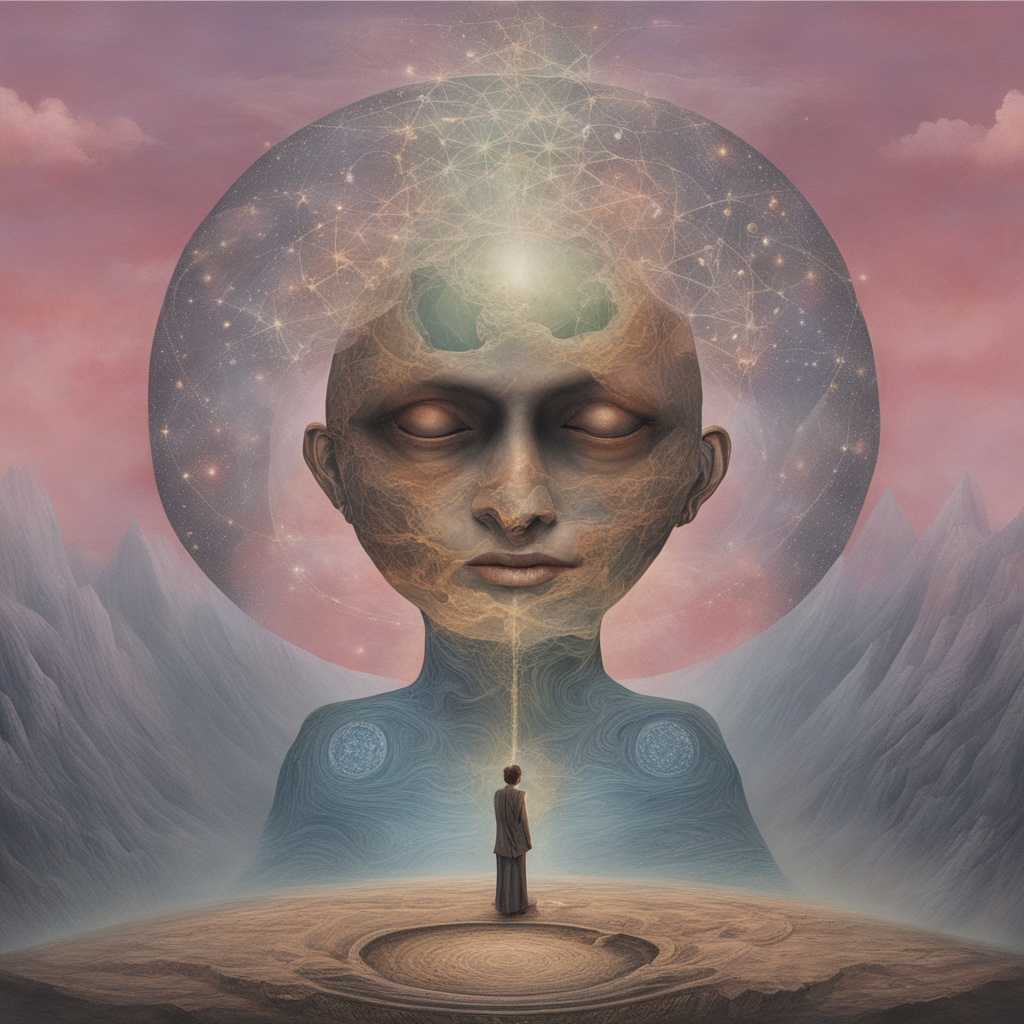Anxiety is always the result of us trying to ‘protect the thought-created idea of ourselves’. This means that we are ‘coming at things’ from the wrong angle, so to speak; we are always coming at things from an angle that’s never going to work out for us. The more anxious we feel the more we try to protect the construct of ourselves that is actually behind the anxiety! This is like going down the road to get to a place when the road in question is actually going somewhere else – the more we progress down this road the worse it is going to get for us!
It’s not even that we are going on a journey to ‘the wrong place’ – we’re trying to go to a place that doesn’t actually exist. This is the big big thing that we just can’t understand – we just can’t understand that the concept that we have of ourselves (which is ‘this’ or ‘that’) hasn’t anything to do with us. We are neither ‘this’ nor ‘that’, as the Vedantic teachings tell us. We are not any of our identifications (‘identifications’ being where we say that we are ‘this’ or that we are ‘that’, whatever ‘this’ or ‘that’ might be). We could also say that identification is where we become congruent with the output (or products) of the conceptualising process.
This shows how crass the business of ‘believing that I am this or that’ really is – how could I ‘be’ the product of my own thinking process’? How ridiculous is this; how can I possibly be merely ‘what I say I am’, or ‘what I think I am’? The conceptualising process is the one by which the world is rendered in a crude or oversimplified way. That’s what we do the whole time, without even knowing that we are doing it. It’s not that there’s anything wrong with this conceptualizing process – we need to make maps or models of the world for the sake of practicality, for the sake of utility, and maps are (of course) over the simplifications of the reality they are mapping. The ‘ridiculous’ thing is that we say that we ARE this oversimplification. Why would we even want to say this kind of thing?
We have an absolute fascination with the output of the thinking/conceptualising process – we are fascinated to the point of the exclusion of anything else. What this means, therefore, is that we are stuck in the situation of being fixated upon the ‘oversimplified version’ of the world to the exclusion of anything else. So what the hell is this all about, we might well ask? What an utterly bizarre situation! This is an utterly bizarre situation and we know nothing absolutely nothing about the fact that we doing it. We do it, but we don’t know that we doing it. As David Bohm says, we do it but we say that we aren’t doing it.
There is a reason for us doing this thing however (this thing where we identify with the mind-created oversimplification of the world and say that it isn’t an oversimplification) and that reason – of course – has to do with the sense of security that we get from living in a grossly oversimplified version of reality that we (implicitly) say isn’t a grossly oversimplified version of reality. If we lived in an oversimplified world and we knew it then obviously there would be no security at all in that! The only way we can obtain the security we desire is by immersing ourselves in this surrogate world and being immersed means not seeing that we are immersed. That’s the whole point of immersion. To play a game is not to know that we are playing a game.
So we ‘do the thing’ (i.e. we identify with the output of the rational-conceptual processor) in order to obtain a sense of security and this is fine – up to a point. We get the security we want. But the hidden problem with this strategy is that we become lawful victims to the phenomenon of anxiety; we can have a sense of security if we want but then we also have to have the anxiety that comes with it, and there is no way around this. There’s no way to get around this because the ‘version of reality’ that we are using to get our sense of security out of doesn’t really exist. Of course it doesn’t really exist – it’s an oversimplification, a ‘model’, and oversimplifications or models exist only in our head. They are ‘conventions’ that we adopt, not actual features of the world as it actually is in itself. The map can’t replace the territory.
The map can’t replace a territory it is true, but the curious thing is that it actually does, in everyday pragmatic terms. This is of course what Jean Baudrillard is talking about in Simulacra and Simulation – this is what hyperreality is all about. We replace the territory with the map all the time and the result of this is that we are completely at the mercy of rampaging existential anxiety. We have made our sense of security, and our sense of well-being, dependent on the map not being the map. We’ve made our SOS dependent therefore, on something into that isn’t true, and so even if – as far as we’re concerned – the map is the same thing as the territory, the inescapable irreducible truth of the matter is that it just isn’t. Self-deception isn’t really a legitimate solution to the problem.
What we call ‘anxiety’ is how that denied truth shows itself – we may not like this manifestation of the denied truth (we definitely don’t like it!) but we can’t discount or gloss over it just because of this. Or rather we can gloss over it, but there’s no wisdom in doing this. When we discount or reinterpret the discomfort that comes from ignoring the truth of the crude ‘positive reality’ that we have created in order to obtain ontological security for ourselves then this is hardly going to improve our situation! The lie is causing problems for us but rather than confront the fact that it is a lie, we push it even further; we invest even more in saying to ourselves that it is true.
The reason we are making this point is because this ‘discounting’ or ‘reinterpreting’ or ‘glossing over’ of anxiety is precisely what we – as a culture – are doing. We are trivialising anxiety, we are saying that it is a ‘nothing but’. Medicine has of course always had a tendency to do this, as the psychologist William James points out. Any ‘non-usual’ state of consciousness is straightaway discounted as being due to some underlying pathology – the only meaning that it has therefore is that it is telling us that some part of our physiology is malfunctioning and needs to be fixed! Strange equals ‘a malfunction’, as far as we concerned. This attitude gives rise to a very profound lack of curiosity about all those states of consciousness that are not familiar to us from our everyday, ‘run-of-the-mill’ experience. Anything that isn’t familiar in this way (and isn’t therefore something that the collective or generic mind will automatically validate for us) is seen as nothing more than an ‘error signal’ that needs to be acted upon promptly in order to safely return the system to its equilibrium state.
This lack of interest in non-equilibrium states of consciousness quickly turns into a lack of interest in life itself, although we would never admit this. Life isn’t a matter of ‘sticking dutifully to the normal’, and ignoring all the signals that tell us that there may be more going on than we – in our dreadfully blinkered way – are prepared to admit. The implication is that the officially-sanctioned, normatively-defined so-called ‘state of consciousness’ is the only thing of interest, the only thing of any value, and that deviations to the norm are therefore a threat to all that is good, to all that is precious. But where would this road lead to if we followed it to its logical conclusion?
The problem is that the type of generic everyday consciousness that we insist is the only legitimate type is simply untenable – it’s ‘a life that can’t actually be lived.’ To be sure, we give it our best shot, but the more cravenly we conform to the officially-sanctioned version of life the more unbearable it becomes. Typically, we will offload this misery on all those people who can’t (or won’t) conform to the strict standards that we have set; we will become judgemental and harshly punishing in our attitude, we will show our ugly side. This might be said to be the basic principle behind all social groups therefore – life in the group would be unbearable if we weren’t either fighting against another group, or judging and condemning those individuals within our group who are unable to conform as successfully as we have done. It’s a sad state of affairs, in other words, and not worthy of us at all.
The same principle accounts very well for the phenomenon whereby we judge and condemn our fellows who happen to be suffering from what in the past had been called ‘mental illness’. Jung points out that neurotic disturbances involve an exaggeration of regular, normal traits that we all have; and these traits (which have to do with control and self-regulation and a concern with safety/security issues) become obviously counter-productive and obviously ‘suffering-producing’ when they are taken too far. Rather than taking intelligent notice of what this blatant counterproductivity actually signifies (i.e. the ultimate untenability of the project that we are engaged in) we discount it, we dismiss it, the ‘reinterpret’ it. If we happen to be the highly educated healthcare professional then we write what’s going on off as ‘a dysfunctional behaviour pattern’ and try to treat it purely as such, and if we are the old-fashioned deeply prejudiced ‘guy on the street’ then we take against anyone who seems to be suffering from mental ill-health and see them in a negative light; we take against them because they remind us of something we don’t want to know about ourselves, which is that we’ve all got the same demons in us even if they haven’t shown themselves yet. No matter whether we are the ‘educated health-care professional’ or the obviously prejudiced ‘person in the street’, we do pretty much the same thing in both cases therefore – we are dismissing mental health disturbances by labelling them and ‘making them safe’. We not seeing what the neurotic or psychotic disturbances really show us; we are fundamentally unwilling to see what they really show us because that would threaten our blinkered position too much.
As mental healthcare professionals, we inevitably trivialise mental neurotic and psychotic conditions. None of us wish to see the profundity of what it is that we are dealing with. We dismiss mental health conditions as being merely ‘a medical matter’ and in so doing we also dismiss the experiences of people who we are dealing with. We implicitly patronise them. It is one thing that characterises our particular cultural/professional attitude to people suffering from mental health conditions it is this disrespectful ‘dismissal’ of the experiences of the people who we are supposed to be helping! Neurotic and psychotic mental suffering is at root a very profound experience and there is a tremendous lesson in it, loathe as we are to learn it (no matter what side of the fence we happen to be on) The lesson that we don’t want to learn is of course that we are not free, even though we are pretending to ourselves that we are. Or we could also say, the lesson is that we are not being authentic, even though we absolutely insist on saying that we are.
The thought-produced version of us doesn’t have any freedom (very obviously it doesn’t have any authenticity either!) – it can’t do, only who we really are underneath this mask or persona can have freedom, clearly. The mask (or the act that we are putting on) can’t ever be free; it can’t ever be free because it’s the prison that we are in! We can hardly insist on bringing our prison around with us wherever we go and yet at the same time think that we are going to somehow stumble across the door to freedom. That would mean that we want to be free and yet imprisoned at the same time, which actually is what we want! We want the security that comes from being externally-determined and we want to be truly authentic and free at the same time and unless we acknowledge the conflict that is going on here we are never going to get anywhere. Unless we acknowledge the conflict for what it is we won’t have any integrity.
It is the prison – being the crudely limiting factor that it is – that is causing this mental suffering, but rather than seeing that this suffering derives from the limitations that we are unconsciously imposing upon ourselves, we ascribe it to all sorts of trivial factors. We absolutely refuse to see it for what it is; we lack the integrity to do that. We are too busy trying to be what the system wants us to be for that. And – as we have just said – we are pathologically unwilling to see that ‘fitting into the system’ and ‘having integrity’ are utterly incompatible – the mask can never be free, but rather than see this we stubbornly continue to ‘protect the mask’ (or ‘protect the act that we are putting on’) right up to the bitter end. Seeing that the construct we are struggling to protect isn’t who we really are is the ultimate revolutionary act, as Krishnamurti says, and society – by its very nature – does not look very favourably upon revolutionary acts…
Art: Khaled Hafez – Realms of the Hyperreal






